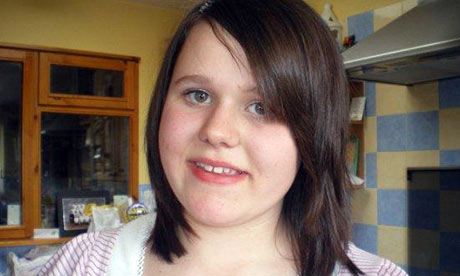Schoolgirl dies after cervical cancer vaccination
• HPV vaccine batch quarantined as 'precautionary measure'
• Vaccination part of national immunization program
• Vaccination part of national immunization program

Natalie Morton, aged 14, from Coventry. Photograph: Caters News Agency Ltd
An urgent investigation has been launched after a 14-year-old girl died shortly after receiving a cervical cancer vaccination at her school.
Natalie Morton was a pupil at the Blue Coat Church of England School inCoventry, where she was given the human papilloma virus (HPV) jab yesterday. She was taken to Coventry University hospital, where she died at lunchtime.
A letter to parents posted on the school's website by the headteacher, Dr Julie Roberts, said a girl had suffered a "rare but extreme reaction" after being given the vaccine. The precise cause of her death remains unknown.
Three other girls from the school are reported to have experienced possible side effects of dizziness and nausea after receiving the Cervarix jab, which was given to female pupils as part of a national immunisation programme against HPV. Their symptoms were described as mild and none was taken to hospital.
Although no link has yet been made between Natalie's death and the HPV vaccine, NHS Coventry said it had quarantined the batch as a "precautionary measure" and had contacted the parents of other children at the school who may have been affected.
Dr Caron Grainger, joint director for public health for NHS Coventry and Coventry city council, said: "Our sympathies are with the girl's family and friends at this difficult time. The incident happened shortly after the girl had received her HPV vaccine in the school. No link can be made between the death and the vaccine until all the facts are known and a postmortem takes place." She added: "We are conducting an urgent and full investigation into the events surrounding this tragedy."
Dr Pim Kon, medical director at GlaxoSmithKline UK, which manufactures Cervarix, offered the company's "deepest sympathies" to the girl's family and friends.
"We are working with the Department of Health (DoH) and the Medicines and Healthcare Products Regulatory Agency (MHRA) to better understand this case, as at this stage the exact cause of this tragic death is unknown," she said.
Although national programmes also exist in other European countries, Britain is the only country to have opted to use Cervarix, rather than a rival brand called Gardasil.
Although the NHS said the drug underwent "rigorous safety testing" before being chosen for the program, the shadow health secretary, Andrew Lansley, called for more transparency over the assessments made of Cervarix and Gardasil. "This is tragic news and will be deeply concerning for all the families involved," he said. "The DoH and the MHRA need to investigate, as a matter of urgency, what the cause of this is so they can assess how widespread the problem could be."
The public health minister, Gillian Merron, said: "It is important we have the results of further investigations as soon as possible to establish the cause of this sad event."
Cervical cancer is responsible for more than 1,000 deaths in Britain each year, with around 3,000 women diagnosed annually.
The national program to immunize all schoolgirls aged 12 and over began across the UK last autumn, with the aim of offering the vaccine to all girls under the age of 18 by 2011. The decision to immunize teenagers before they become sexually active has been controversial, with some critics of the program claiming the treatment would encourage more teenagers to engage in sexual activity.
According to Dr. Robert O. Young, a research scientist at the pH Miracle Center states, "true immunity and protection against cervical cancer can be achieved with an alkaline lifestyle and diet and without the harmful effects of a poisonous acidic vaccination."




0 comments:
Post a Comment